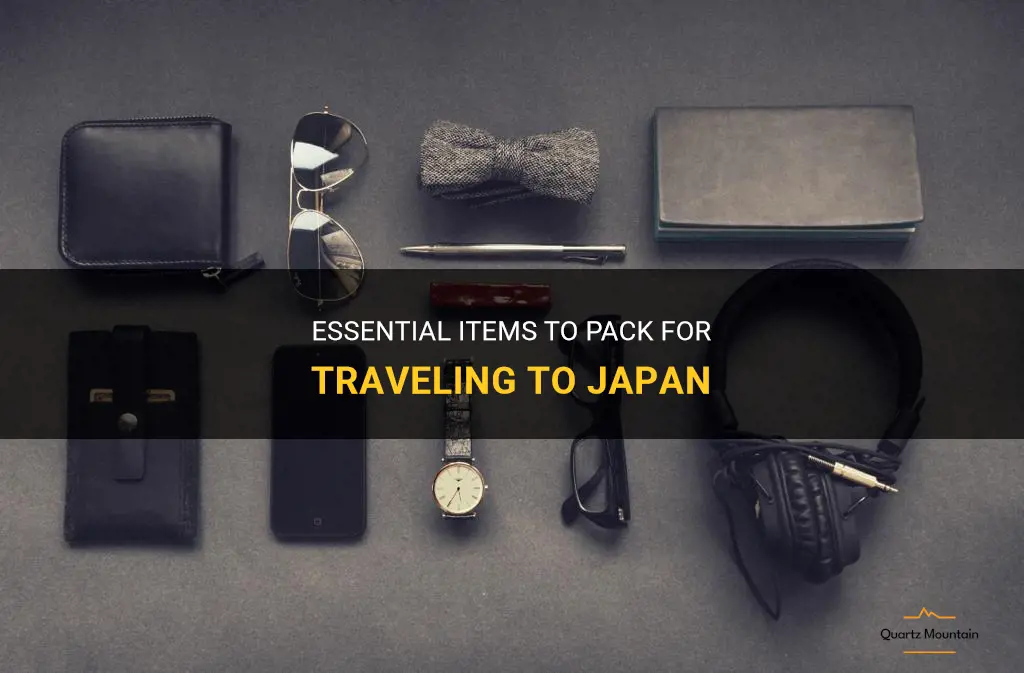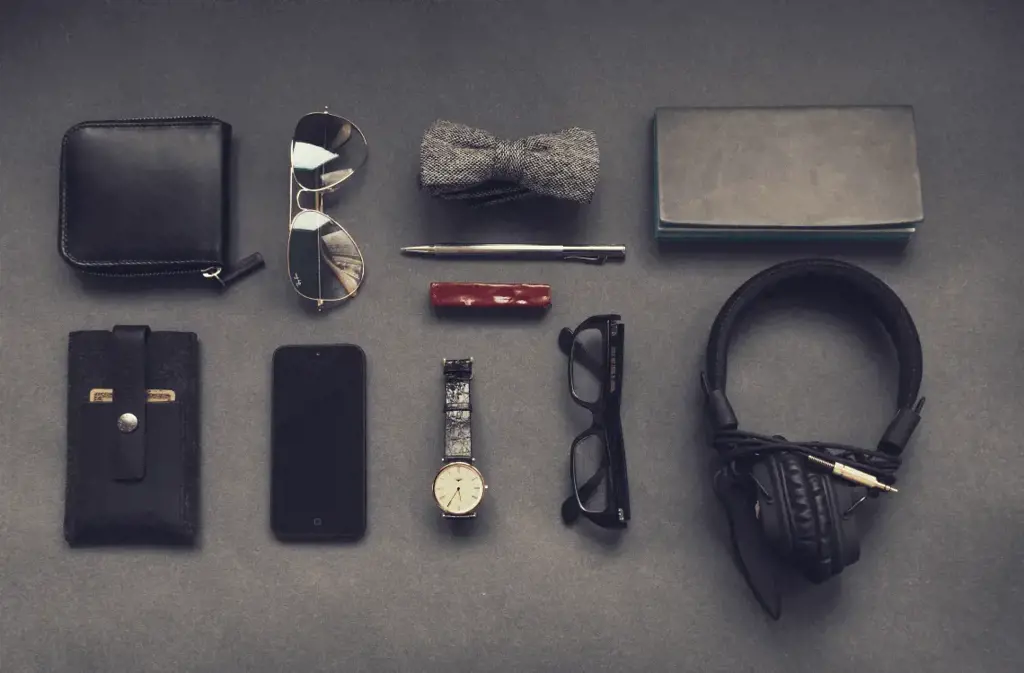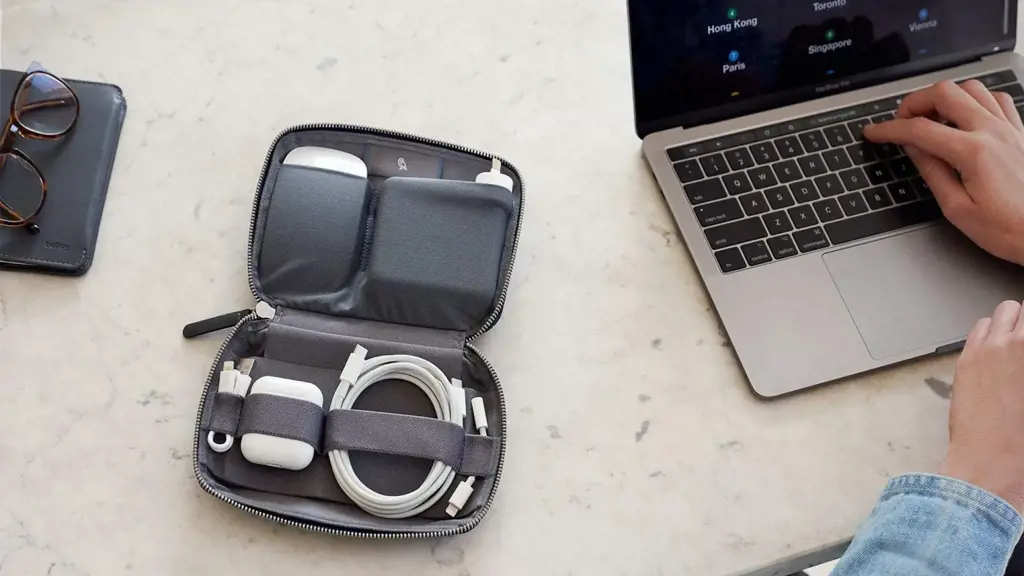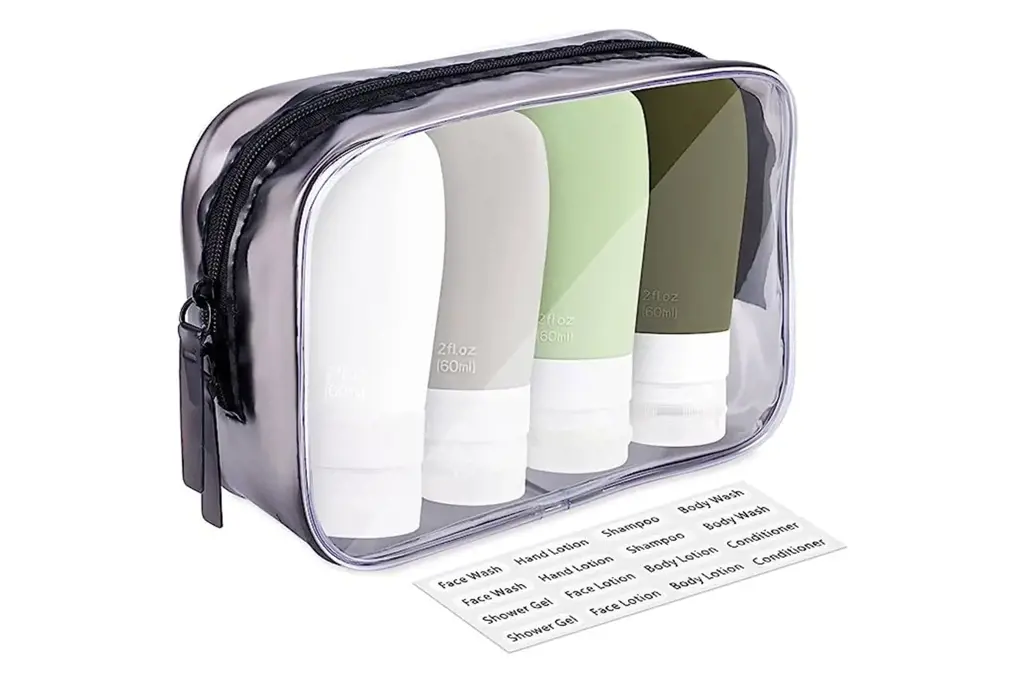
Traveling to Japan can be an incredibly exciting and enriching experience, filled with ancient traditions, vibrant cities, and breathtaking scenery. However, with so much to see and do, it's essential to be prepared and pack the right items for your trip. From cultural necessities to practical essentials, here is a guide to the must-have items you should pack when traveling to Japan. Whether you're exploring the bustling streets of Tokyo or immersing yourself in the tranquility of Kyoto, these items will ensure you have a seamless and enjoyable adventure in the Land of the Rising Sun.
| Characteristic | Values |
|---|---|
| Weather | Varies throughout the year. Summers are hot and humid, while winters are cold with the possibility of snow. Bring lightweight and breathable clothing for summers, and layer up with warm clothing for winters. |
| Voltage | 100 V |
| Time Zone | JST (Japan Standard Time), UTC +9 |
| Currency | Japanese Yen (JPY) |
| Language | Japanese |
| Visa Requirements | Varies depending on the country of the traveler. Check with the Japanese embassy or consulate for specific requirements. |
| Safety | Japan is generally a safe country to travel to, but it's always advisable to take precautions and be aware of your surroundings. |
| Transportation | Japan has an extensive and efficient public transportation system, including trains, buses, and subways. |
| Food | Japanese cuisine is varied and delicious, with options for all tastes. From sushi and ramen to tempura and teriyaki, food lovers will be in heaven. |
| Cultural Etiquette | Japanese culture has its own set of customs that visitors should be aware of. These include removing shoes indoors, bowing as a sign of respect, and avoiding public displays of affection. |
| Wi-Fi Availability | Wi-Fi is widely available in Japan, including in hotels, cafes, and public areas. It's advisable to rent a pocket Wi-Fi or get a SIM card for convenient internet access. |
| Emergency Numbers | Police: 110; Ambulance/Fire: 119 |
| Important Documents | Passport, visa (if required), travel insurance, emergency contacts, and copies of important documents. |
| Medications and Health | It's advisable to bring any necessary prescription medications and a basic first aid kit. Tap water is generally safe to drink in Japan. |
| Clothing | Pack appropriate clothing for the season and activities planned. Comfortable shoes are recommended for exploring. |
| Electronics | Japan uses Type A and Type B electrical outlets, so bring an adapter if necessary. |
| Toiletries | Basic toiletries such as toothpaste, toothbrush, shampoo, and soap are readily available in Japan. |
| Plug Type | Type A, Type B |
What You'll Learn
- What are the essential items to pack for a trip to Japan?
- Are there any specific clothing recommendations for different seasons in Japan?
- What electronics or gadgets should I bring when traveling to Japan?
- Are there any specific toiletries or personal care items that are recommended to pack for a trip to Japan?
- Are there any cultural or etiquette-related items that travelers should pack when visiting Japan?

What are the essential items to pack for a trip to Japan?

When preparing for a trip to Japan, it's important to pack the essential items that will ensure a comfortable and enjoyable experience. Whether you're visiting the bustling streets of Tokyo or exploring the serene temples in Kyoto, having the right items in your suitcase will make a big difference. Here are some essential items that should be on your packing list for a trip to Japan.
- Comfortable Walking Shoes: Japan is known for its extensive public transportation system and the countless attractions and sights to explore. Be prepared to do a lot of walking as you navigate through crowded streets, wander through beautiful gardens, and visit historical landmarks. Comfortable walking shoes are a must to keep your feet happy and prevent any discomfort or blisters.
- Universal Plug Adapter: Japan uses a different type of electrical plug compared to many other countries. To charge your electronic devices, including your phone and camera, it's crucial to have a universal plug adapter. This will ensure that you can easily connect to the Japanese electrical outlets without any issues.
- Portable Wi-Fi Router: Staying connected during your trip is essential for navigating public transportation and staying in touch with loved ones. Investing in a portable Wi-Fi router will allow you to access the internet wherever you go, making it easier to use maps, search for information, and communicate with others.
- Japan Rail Pass: If you plan on traveling between different cities in Japan, a Japan Rail Pass is a cost-effective option. This pass allows unlimited travel on the Shinkansen bullet train and other JR trains for a set number of days. It's important to purchase this pass before you arrive in Japan as it's not available for purchase once you're in the country.
- Cash: While credit cards are widely accepted in major cities and tourist establishments, it's always a good idea to have cash on hand. Many smaller shops, local eateries, and street vendors may only accept cash payments. It's also helpful to carry small denominations of Japanese yen for convenience.
- Pocket Wi-Fi Translator: If you're not familiar with the Japanese language, a pocket Wi-Fi translator can be a lifesaver. These devices can help you communicate with locals, read signs, and navigate your way through the country. They often come with various language options and can quickly translate phrases or sentences to facilitate conversations.
- Travel Adapter: In addition to a universal plug adapter, it's also recommended to have a travel adapter for your electronic devices. This will ensure that you can easily charge your phone, camera, or any other electronic gadget you may be carrying.
- Comfortable Clothing: Japan experiences different seasons throughout the year, so it's important to pack appropriate clothing based on the weather during your visit. In general, wearing comfortable and modest clothing is recommended. Comfortable, breathable fabrics and layers are ideal for exploring the diverse landscapes and varying temperatures.
- Travel Insurance: Accidents and unforeseen events can happen during any trip, so it's important to have travel insurance. This will provide you with protection and financial coverage in case of emergencies, medical issues, luggage loss, or trip cancellations.
- Medications and Prescriptions: If you take any medications regularly, it's essential to bring an ample supply for the duration of your trip. It's also a good idea to carry a copy of your prescriptions and medical documentation in case of any emergencies or if you need to refill your medications while in Japan.
- Backpack or Day Bag: Having a small backpack or day bag is convenient for carrying your essentials while exploring. It can hold items such as your water bottle, camera, snacks, a light jacket, and any souvenirs you may pick up along the way.
Remember to check the specific requirements and recommendations for your trip to Japan, as they can vary based on your travel itinerary and personal preferences. By packing these essential items, you'll be well-prepared to have a memorable and enjoyable trip to Japan.
The Ultimate Guide to Packing for a Trip to Milan
You may want to see also

Are there any specific clothing recommendations for different seasons in Japan?

Whether you're planning a trip to Japan or you're already living there, it's essential to know how to dress appropriately for the different seasons. Japan experiences distinct changes in weather throughout the year, with each season bringing its own unique climate and charms. To ensure your comfort and enjoyment, here are some clothing recommendations for each season in Japan.
Spring (March to May):
Spring in Japan is a beautiful time, with cherry blossoms blooming across the country. However, it can also be quite changeable, with temperatures ranging from cool to mild. During this season, it's best to dress in layers, so you can easily adjust to the fluctuating weather. Light sweaters or cardigans, long-sleeved shirts, and lightweight jackets are ideal for the cool mornings and evenings. As the day warms up, you can remove a layer or two to stay comfortable.
Summer (June to August):
Summers in Japan can be hot and humid, especially in urban areas. Lightweight, breathable clothing is a must to beat the heat. Opt for loose-fitting, cotton or linen clothes that allow air circulation and help absorb sweat. T-shirts, shorts, skirts, and dresses are suitable for casual occasions. Don't forget to bring a hat, sunglasses, and sunscreen to protect yourself from the strong summer sun when out and about.
Autumn (September to November):
Autumn in Japan is known for its stunning foliage, making it a popular season for tourists. The weather during this time is generally mild and pleasant, but it can get chilly, especially towards the end of November. Light jackets, sweaters, and long-sleeved shirts are perfect for the cooler days. Layering is still important, as the temperature can change throughout the day. Don't forget to pack some warm clothing for the colder nights.
Winter (December to February):
Japan experiences cold winters, with temperatures dropping below freezing in many regions. It's essential to dress warmly to protect yourself from the cold. Thick, insulated coats, sweaters, scarves, gloves, and hats are a must. Layering is crucial during winter, as buildings and public transportation tend to be heated, and you may need to remove some clothing when indoors. Thermal undergarments and warm socks are also recommended to keep the body warm in extremely cold weather.
It's important to remember that these recommendations may vary depending on the region you are in within Japan. For example, Hokkaido experiences much colder winters than Okinawa. Therefore, it's always a good idea to check the weather forecast for your specific location before packing and to dress accordingly.
In conclusion, dressing appropriately for the different seasons in Japan is crucial for your comfort and enjoyment. By following these clothing recommendations, you can ensure that you stay comfortable while exploring all that Japan has to offer, no matter the time of year. So, pack your bags with versatile, layerable clothes and get ready to experience the beauty of Japan in every season.
Prepare Your Home Before Movers Arrive to Pack: 8 Essential Steps
You may want to see also

What electronics or gadgets should I bring when traveling to Japan?

When traveling to Japan, it's important to be well-prepared with the necessary electronics and gadgets to ensure a smooth and enjoyable trip. Whether you're visiting the bustling streets of Tokyo or exploring the traditional beauty of Kyoto, having the right devices can enhance your experience and make your journey more convenient. Here are some essential electronics and gadgets to consider bringing with you when traveling to Japan.
- Smartphone: A smartphone is an absolute must-have when traveling to Japan. Not only does it serve as a communication device, but it also acts as a navigation tool, language translator, and travel guide. Make sure to download helpful apps such as Google Maps, Google Translate, and Japan Travel by NAVITIME to navigate the city streets and communicate with locals.
- Portable Wi-Fi Router: Staying connected is essential, especially when traveling in a foreign country. Consider renting a portable Wi-Fi router or purchasing a local SIM card to have internet access wherever you go. This will allow you to easily access maps, browse the internet, and stay in touch with friends and family back home.
- Camera: Japan is a country known for its stunning landscapes, vibrant cityscapes, and unique cultural experiences. To capture these moments and create lasting memories, bring a good quality camera. Whether it's a DSLR, mirrorless, or even a high-end smartphone with a good camera, having the ability to capture beautiful photos will enhance your trip.
- Universal Travel Adapter: Japan uses Type A and Type B outlets, which may be different from the plugs used in your home country. To be able to charge your devices, it's essential to bring a universal travel adapter that can accommodate various plug types. This will ensure you can charge your smartphone, camera, and other gadgets without any issues.
- Portable Power Bank: With all the exploring and sightseeing, your devices are bound to run out of battery. To avoid getting stranded with a dead phone or camera, bring a portable power bank. This will allow you to recharge your devices on the go and ensure they are always ready for use.
- Noise-Canceling Headphones: Traveling can be exhausting, and sometimes you just need a break from the hustle and bustle. Noise-canceling headphones can be a lifesaver, especially during long flights or train rides. They will help you block out background noise and provide a more relaxing travel experience.
- Electronic Language Translator: While English is widely spoken in major tourist areas, having an electronic language translator can be extremely helpful when communicating with locals who may not speak fluent English. These devices can help you overcome language barriers and make your interactions more enjoyable and efficient.
- E-Reader: If you're an avid reader, bringing an e-reader can be a great way to save space in your luggage. Instead of carrying multiple books, you can have a whole library at your fingertips. This will allow you to read on the go and make the most of your downtime during the trip.
In conclusion, when traveling to Japan, it's important to bring the right electronics and gadgets to enhance your experience. From your smartphone and portable Wi-Fi router to your camera and noise-canceling headphones, these devices will ensure you can navigate, communicate, and capture memories during your trip. Don't forget to pack a universal travel adapter, portable power bank, electronic language translator, and e-reader to make your journey more convenient and enjoyable. With these essentials in hand, you'll be well-prepared to explore the wonders of Japan.
The Ultimate Guide to Packing for the Santa Cruz Trek
You may want to see also

Are there any specific toiletries or personal care items that are recommended to pack for a trip to Japan?

When planning a trip to Japan, it's important to pack the necessary toiletries and personal care items to ensure you have everything you need during your stay. While many items can be purchased locally, there may be specific products or preferences that you want to bring from home. Here are some recommendations for toiletries and personal care items to consider packing for a trip to Japan.
- Shampoo and conditioner: While most hotels in Japan provide basic toiletries, the quality and brand may not meet your preferences. If you have specific hair care needs or preferences, it's a good idea to bring travel-sized bottles of your favorite shampoo and conditioner.
- Body wash or soap: Again, hotels in Japan usually provide body wash or soap, but if you have sensitive skin or prefer a particular brand, it's best to bring your own. Travel-sized bottles are convenient and won't take up much space in your luggage.
- Toothbrush and toothpaste: While toothbrushes are commonly provided by hotels, the toothpaste provided may be different from what you're used to. If you have a preferred brand or type of toothpaste, it's a good idea to bring your own.
- Deodorant: Deodorant is not as common in Japan as it is in some other countries, and the selections available may be limited. If you have a preferred brand or type of deodorant, you may want to bring enough to last your entire trip.
- Moisturizer: Japan's climate can be dry, especially during the winter months. Bringing a small bottle of moisturizer can help keep your skin hydrated and prevent dryness or flakiness.
- Sunscreen: If you plan on spending time outdoors or visiting attractions that involve a lot of walking or hiking, sunscreen is essential to protect your skin from the sun's harmful rays. It can be purchased in Japan, but it's always a good idea to bring your own, especially if you have specific preferences or sensitivities.
- Contact lens solution: If you wear contact lenses, it's recommended to bring enough contact lens solution to last your entire trip. While you can buy contact lens solution in Japan, it may be more convenient to have your preferred brand on hand.
- Feminine hygiene products: If you use tampons or specific brands of sanitary pads, it's advisable to bring a supply from home as the selection in Japan may not be the same. While sanitary supplies are readily available in Japan, the style and size you prefer may not be as commonly found.
Remember to pack these toiletries and personal care items in travel-sized containers to comply with airport regulations and minimize space in your luggage. Additionally, consider carrying a small toiletry bag with you during your daily outings to have any necessary items on hand.
In conclusion, while many toiletries and personal care items can be purchased in Japan, it's recommended to bring your preferred brands or specific items that may not be as readily available. By packing travel-sized bottles of shampoo, conditioner, body wash, toothpaste, and any other personal care items you need, you can ensure a comfortable and familiar experience during your trip to Japan.
Essential Gear Checklist for a GORUCK Light Challenge
You may want to see also

Are there any cultural or etiquette-related items that travelers should pack when visiting Japan?

When traveling to Japan, it is important to be mindful of the country's cultural customs and etiquettes. Japanese culture places a strong emphasis on respect, politeness, and manners, and being aware of these practices can greatly enhance your experience in the country. To help travelers navigate these cultural nuances, there are a few items that they should consider packing.
Language Guidebook:
While English is spoken in some parts of Japan, especially in tourist areas, it is not widely spoken in rural areas or by older generations. Having a language guidebook can help you learn basic Japanese phrases and greetings, allowing you to communicate more effectively with locals, show respect, and create a positive impression.
Business Cards:
Exchanging business cards is a common practice in Japan, even in non-business settings. Having your own business cards with your contact information printed in both English and Japanese can be a helpful tool for making connections and demonstrating professionalism. It is important to present and receive business cards with both hands and take a moment to read the card before putting it away.
Portable Chopsticks or Cutlery:
Japanese cuisine is renowned worldwide, and trying local dishes is a must for any traveler. While most restaurants provide chopsticks or cutlery, having your own portable chopsticks or utensils can be useful, especially if you have dietary restrictions or prefer using your own tools. It is considered impolite to use your own chopsticks to take food from a shared plate or to use them to pick up food directly from a communal dish.
Comfortable Shoes:
In Japan, it is customary to take off your shoes before entering traditional homes, temples, and some restaurants. Wearing comfortable shoes that can be easily slipped on and off will make this process more convenient. Additionally, Japan is known for its efficient and extensive public transportation system, which often involves a lot of walking. Packing comfortable walking shoes is crucial to enjoy exploring the cities without discomfort.
Small Towel or Handkerchiefs:
Public restrooms in Japan often do not provide hand towels or paper towels. Instead, it is common for locals to carry their own small towels or handkerchiefs to dry their hands. Having a small towel or handkerchief in your bag can be practical in these situations and help you adhere to local customs.
Travel Adapter:
Make sure to pack a travel adapter that is compatible with Japanese power outlets. This will allow you to charge your electronic devices and stay connected while exploring the country. Japanese power outlets typically use 100 volts and have two flat pins, so confirming the compatibility of your adapter is essential.
Gift Giving:
In Japan, gift giving is an important practice, and it is customary to bring gifts when visiting someone's home or when invited to a social gathering. Consider packing small, thoughtful gifts from your home country, such as locally-made sweets or souvenirs, to show appreciation and respect towards your hosts.
Being mindful of these cultural and etiquette-related items when visiting Japan can help you immerse yourself in the local customs and create a more meaningful experience. Enjoy your trip to Japan and embrace the rich cultural heritage that the country has to offer!
Essential Items to Include in Your Fall Packing List for Wyoming
You may want to see also
Frequently asked questions
When packing for a trip to Japan, it's important to consider the season and the activities you'll be doing. In general, it's a good idea to pack comfortable clothing that can be layered, as the weather can vary greatly depending on the region and time of year. Don't forget to pack comfortable walking shoes, as you'll likely be doing a lot of walking and exploring. Additionally, it's a good idea to bring an adapter for your electronic devices, as Japan uses a different plug type than many other countries.
While there are no specific items that are absolutely necessary to pack for a visit to Japan, there are a few things that you may find helpful to have. One of these is a pocket Wi-Fi device, which can provide you with internet access throughout your trip. This can be especially useful if you're relying on Google Maps or translation apps to get around. It's also a good idea to pack a portable charger for your electronic devices, as you'll likely be using them throughout the day and may not always have access to a power source.
When packing for a trip to Japan, it's important to be aware of the country's customs and cultural norms. There are a few items that you should avoid packing in order to avoid any potential misunderstandings or discomfort. One of these is excessive amounts of cash, as Japan is a highly developed country with plenty of ATMs and credit card acceptance. It's also advisable to avoid packing clothing that is overly revealing or provocative, as Japan has a conservative culture. Additionally, it's a good idea to familiarize yourself with Japan's regulations on medication and prohibited items to avoid any issues at customs.







